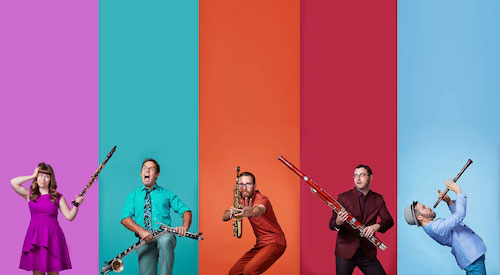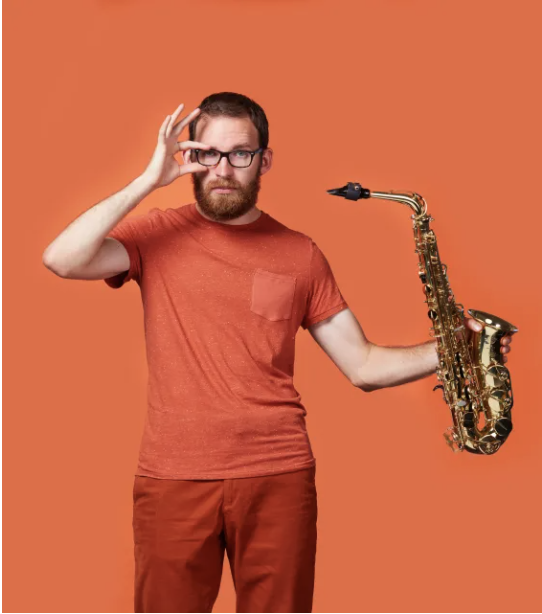by Jarrett Hoffman

A variation on the wind quintet, with flute and horn jettisoned in favor of saxophone and bass clarinet — reed-brethren of oboe, clarinet, and bassoon — the instrumentation was born as recently as 1985, when five high schoolers in Amsterdam came together to form Calefax. The group gradually amassed a body of repertoire where there was none, and began to spread their musical seed.
One of the groups they inspired to spring up is the Detroit-based Akropolis Reed Quintet — oboist Tim Gocklin, clarinetist Kari Landry, saxophonist Matt Landry, bassoonist Ryan Reynolds, and bass clarinetist Andrew Koeppe — winners of the Gold Medal at the 2014 Fischoff National Chamber Music Competition, among several national prizes.
Now celebrating their 15th-anniversary season, Akropolis will visit Northeast Ohio next week for a recital on the Tuesday Musical series on November 7 at 7:30 pm at E.J. Thomas Hall.
Their program includes Marc Mellits’s Splinter, Willem Jeths’s Maktub, George Gershwin’s An American in Paris (arranged by none other than Calefax saxophonist Raaf Hekkema), and a recent commission of theirs: Omar Thomas’s Moods and Attitudes, a classical work fueled by the composer’s background in jazz, its movements visiting the genres of blues, ballad, and bebop. Tickets are available here.
In a recent conversation with Akropolis saxophonist Matt Landry, I began by asking about the genesis of the group, which was founded at the University of Michigan — at first with a different sax player, Dan Goff, who soon left to take a job in the U.S. Army Field Band.

But once we started playing together, everybody got really interested. It was just apparent from the beginning that what we were doing together was an experience we weren’t going to get anywhere else in school. When you do something that has absolutely no convention whatsoever — no expectations, no traditions — people might think of it as difficult. But all of that we just saw as an opportunity.
Jarrett Hoffman: Your program for Tuesday Musical has four pieces, two on each half. I saw some other Akropolis programs set up that way as well, sometimes exploring themes with those pairings.
ML: I would say that there’s not necessarily a thematic relationship between any of the music here. But there is a very conscientious effort to create a flow that introduces the audience to who we are, then allows them to see what we bring to the world and how we view our artistry. We also want them to have a variety of experiences and emotions during the concert. And we want to include some pieces that are familiar, like American in Paris, as well as just sounds and musical concepts that are familiar. And this entire program is very approachable.
But there’s not really any thematic pairing going on. For us, it’s about pairing energy and style between the pieces. So I would say that the two halves are each an individual experience.
JH: The newest piece on the program is Omar Thomas’s Moves and Attitudes, which I think you all premiered this past summer at your Together We Sound festival in Detroit, is that right?
ML: We ended up doing it a little earlier than that, because it just happened to be finished early. So it was in March, actually down in New Orleans, which was cool because it’s a very jazzy piece.

ML: There definitely was not a concerted effort to do that. We didn’t sit down and say, it would be cool if we did this, and in fact we don’t really ever do that. Things happen very organically. So we don’t have ideas about how things are going to unfold artistically, but what we do have are people who we want to work with, because we’re really interested in their music. And then we notice things that work, so we get better and better at collaborating with the right people at the right time.
We’re really interested in American music and composers that express a variety of different elements of American music. So for us, it always made sense to approach people with experience in jazz. And Omar also has a lot of experience with wind band writing, which is why we figured this would all work out very well. [In 2019, Thomas’ Come Sunday made him the first Black composer to receive the National Bandmasters Association/Revelli Award.]
You know, there are these jazz arrangements that have been done for reed quintet. And it’s hard to explain, but it just kind of works — the reed quintet is kind of like a little big band, and it’s got a bit of a Dixieland vibe to it. So this type of music tends to work. And we’ve gotten better at the idiom. We don’t play jazz, but this piece has pretty legitimate bebop in it, composed in a way that is very entry-level for us, which is great.
With all the composers we work with, no matter what their background is, basically there are two tenets to the process. We want them to express themself and their voice, and we want to be utilized in a way that allows us to express our artistry. Anything that combines those two things is going to be a successful collaboration.
With Omar, the first movement is a blue shuffle, but it’s also contemporary classical music. He utilizes modern scale patterns that you would find in some advanced etude book, and then he puts those over blues chords. So it sounds like Akropolis doing this very Akropolis thing, but we’re playing blues at the same time. He also uses some multiphonics that work roughly within a blues chord progression, and they’re used sparingly, but it creates this kind of jolt.
So you can hear that it’s a blues-contemporary-classical piece all together — and it’s just dynamite.
Published on ClevelandClassical.com November 2, 2023.
Click here for a printable copy of this article


